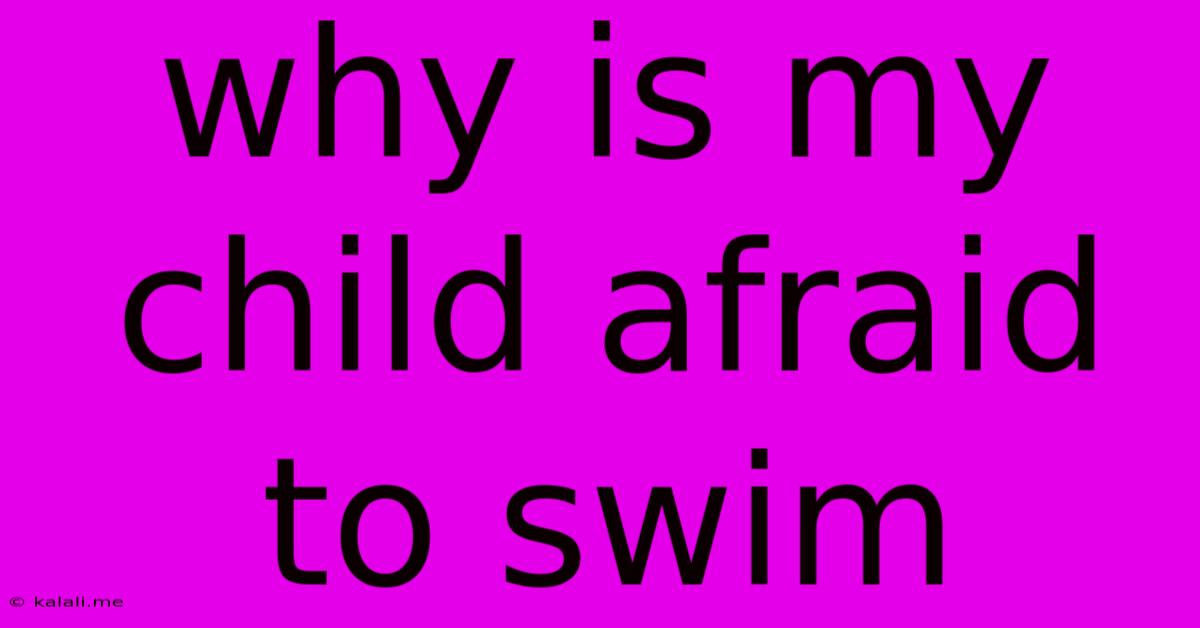Why Is My Child Afraid To Swim
Kalali
Jun 06, 2025 · 3 min read

Table of Contents
Why Is My Child Afraid of Swimming? Understanding and Overcoming Aquaphobia in Kids
It's heartbreaking to see your child terrified of the water. Many parents face this challenge, witnessing their little ones cling to the pool edge or burst into tears at the mere mention of swimming lessons. This article delves into the common reasons behind a child's fear of swimming, offering insights and practical strategies to help them overcome their aquaphobia and enjoy the water safely.
Understanding Childhood Aquaphobia: A child's fear of swimming, or aquaphobia, isn't simply about not liking the water; it's a genuine anxiety rooted in various factors. Understanding the root cause is the crucial first step in addressing the fear effectively. This involves patience, empathy, and a gradual, supportive approach.
Common Reasons Behind a Child's Fear of Swimming:
-
Negative Experiences: This is often the primary culprit. A near-drowning experience, even a minor one, can leave a lasting impact. A sudden unexpected submersion, a frightening incident involving water, or witnessing a distressing event related to water can create a powerful phobia. Even seemingly insignificant events, like a splash in the face, can trigger a fear response in sensitive children.
-
Lack of Familiarity and Control: Children thrive on predictability and control. The unpredictable nature of water – its movement, depth, and coolness – can be overwhelming for a child who lacks experience and feels a loss of control. This is especially true for younger children who haven't developed strong swimming skills or water safety awareness.
-
Inherited Fear or Learned Behavior: Fear can be genetic, passed down from parents or other family members with a fear of water. Similarly, children often learn through observation and imitation. If a parent expresses anxiety around water, a child might subconsciously adopt that fear.
-
Sensory Sensitivities: Some children are simply more sensitive to certain sensory inputs. The feel of water, the temperature change, or even the sound of splashing might trigger an averse reaction, contributing to their fear of swimming.
-
Developmental Stages: The developmental stage of a child significantly impacts their ability to cope with fear. Younger children might struggle to articulate their fears, while older children may exhibit more complex anxieties.
Helping Your Child Overcome Their Fear of Swimming:
Overcoming a child's fear of swimming requires a sensitive and patient approach. Avoid forcing them; instead, focus on building trust and confidence.
-
Start Slow and Positive: Begin with simple water activities like playing in shallow water, splashing, and getting comfortable with the sensation of water on their skin. Make it fun and playful, focusing on positive experiences.
-
Gradual Exposure: Gradually increase the level of water exposure. Start with their feet, then knees, and slowly work their way up to submerging their face. Use positive reinforcement and praise every small step of progress.
-
Professional Guidance: Swimming lessons with a qualified and experienced instructor are highly beneficial. A skilled instructor understands child psychology and can build trust, creating a safe and supportive learning environment.
-
Building Confidence: Encourage water play through games and activities. Using floats and water toys can help children feel more secure and in control.
-
Address Underlying Issues: If the fear stems from a traumatic event, consider seeking professional help from a child psychologist or therapist. They can help your child process their emotions and develop coping mechanisms.
-
Patience and Empathy: Remember, overcoming a fear takes time and patience. Avoid pressure and celebrate even the smallest victories. Your support and understanding are vital in helping your child conquer their fear and develop a love for swimming.
Conclusion: A child's fear of swimming is a common issue, stemming from various factors. By understanding the underlying causes, employing a gradual and supportive approach, and seeking professional help when needed, parents can effectively help their children overcome their aquaphobia and learn to enjoy the water safely and confidently. Remember, consistent positive reinforcement and a patient approach are key to success.
Latest Posts
Latest Posts
-
How Do You Install Crown Molding On Cabinets
Jun 06, 2025
-
Proffessors From Othet Schools In Harry Potter
Jun 06, 2025
-
Bash Check If File Is Empty
Jun 06, 2025
-
Is Superman Is Stronger Than The World Baseball
Jun 06, 2025
-
Furnace Turns Off After 5 Minutes
Jun 06, 2025
Related Post
Thank you for visiting our website which covers about Why Is My Child Afraid To Swim . We hope the information provided has been useful to you. Feel free to contact us if you have any questions or need further assistance. See you next time and don't miss to bookmark.